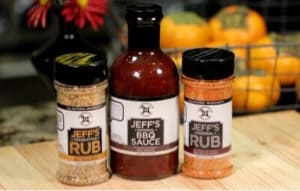OK I was just reading in the Charcuterie and it doesn't say anything about a cure.. And that the salt was the preservative in this recipe .. I am getting confused..
[h1] [/h1]
If you're using a Charcuterie recipe, then follow it to the letter, including drying temps. If it calls for 160*, then that's what you need to use, regardless of the temptation to reduce temps for slower drying to improve texture, or whatever other reason...don't deviate from the recipe's guidelines.
If this drying temperature is causing texture issues, then all I can say is that you will have to live with that.
The alternative is to change to a recipe using a wet-cure instead of a brine/marinade. If you use cure, you have much more flexibility in drying temps.
Regarding converting your currently used recipe to a wet-cure:
I need to know, do you add additional salt to the marinade that could be omitted or reduced if using a cure mix, such as table salt or kosher salt added by weight or measure? If there isn't, it may add to the difficulty a bit, but we'll see if I can still work it up for you...I'm pretty close right now. I just want to make sure I have all the angles covered before I kick out the method for converting from your current brine/marinade to a wet-cure.
I am already working up most of the details for you to reformulate into a wet-cure while still keeping the same sodium content and flavor profile. It should work like a snap, and it may require you to be able to know exactly how much added salt there is, including what's in the worsty/soy sauce, and I'll tell you how to do that as well.
You may or may not be able to use TQ instead of cure #1, which uses less by measure per pound...depends on how much sodium you're using right now. I can help you run the numbers if you're not good with math...I am, so no biggy.
Come on back and let me know if you want to roll with this conversion to a wet-cure, and also, if you add additional salt over and above what the worsty/soy has, as well as if there's a seasoning blend which has salt. I don't need to know what it is, just if it has salt, which will need to be accounted for as well, but we'll figure it out.
You're it...hmm, this is kinda like
phone tag...LOL!!!
Eric








